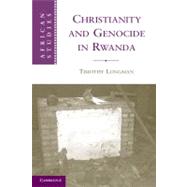
Note: Supplemental materials are not guaranteed with Rental or Used book purchases.
Purchase Benefits
Looking to rent a book? Rent Christianity and Genocide in Rwanda [ISBN: 9780521269537] for the semester, quarter, and short term or search our site for other textbooks by Timothy Longman. Renting a textbook can save you up to 90% from the cost of buying.
| Introduction | |
| 'People came to mass each day to pray, then they went out to kill': Christian churches, civil society, and genocide | |
| 'River of Blood' | |
| 'Render unto Caesar and Musinga …': Christianity and the colonial state | |
| Churches and the politics of ethnicity | |
| 'Working hand in hand': Christian churches and the postcolonial state (1962-1990) | |
| 'Giants with feet of clay': the churches and democratization (1990-1992) | |
| 'It is the end of the world': Christian churches and genocide (1993-1994) | |
| 'God Has Hidden His Face' | |
| Kirinda: local churches and the construction of hegemony | |
| Biguhu: local churches, empowerment of the poor and challenges to hegemony | |
| 'Commanded by the devil': Christian involvement in the genocide in Kirinda and Biguhu; Conclusion | |
| Churches and accounting for genocide | |
| Table of Contents provided by Publisher. All Rights Reserved. |
The New copy of this book will include any supplemental materials advertised. Please check the title of the book to determine if it should include any access cards, study guides, lab manuals, CDs, etc.
The Used, Rental and eBook copies of this book are not guaranteed to include any supplemental materials. Typically, only the book itself is included. This is true even if the title states it includes any access cards, study guides, lab manuals, CDs, etc.